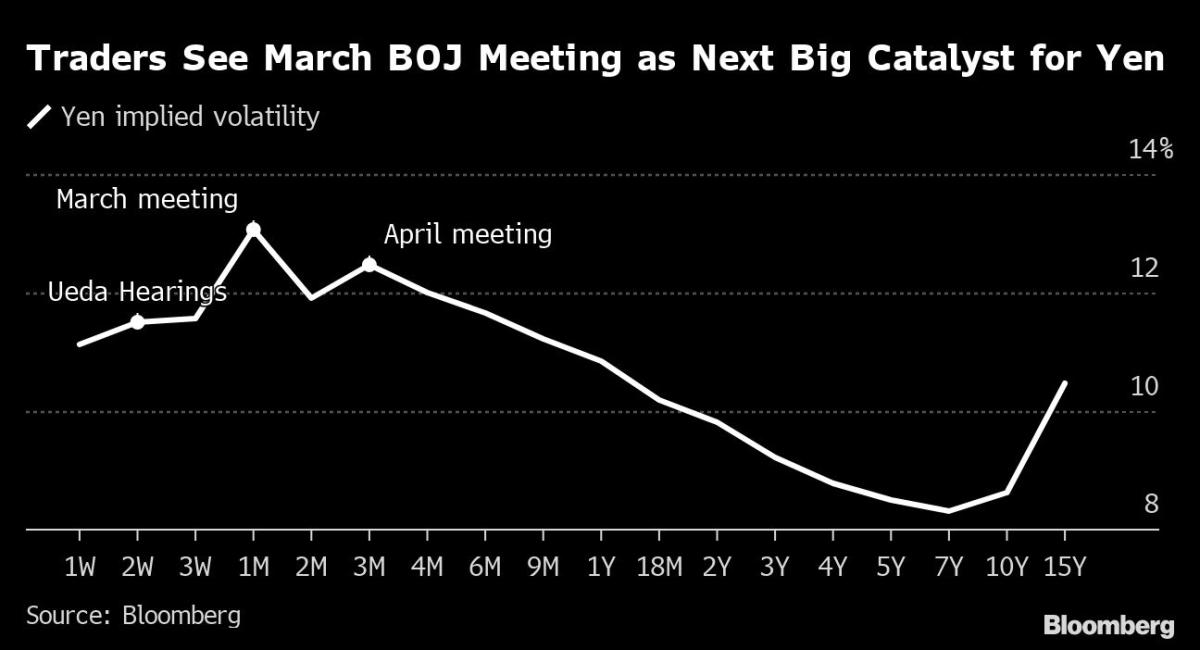(Bloomberg) – Bank of Japan observers are warning of the external risk that Governor Haruhiko Kuroda could surprise international markets one last time next month with adjustments to ease the transition process for his nominated successor, Kazuo Ueda.
Most read by Bloomberg
The central bank’s yield curve control program already poses a complicated challenge for Ueda. Once at the helm of the BOJ, the candidate is likely to face strong market pressures for change, although he may prefer to take the time to carefully assess the extraordinary stimulus measures of the last decade as an economist.
Because of this, some BOJ observers are warning of the risk of a surprise at Kuroda’s final meeting, which ends on March 10. Most economists see action coming after Ueda takes the helm.
“It depends on market developments, but I see a 50/50 chance” that the BOJ’s yield target range will be widened again in March to allow the new leadership to review policy in a calmer environment, said Ryutaro Kono, Japan’s chief economist at BNP Paribas SA.
If the BOJ doesn’t move next month, Ueda could face “massive bond selling” before its first meeting, Kono added.
So far, Kuroda has said that no further YCC adjustments are required after December’s optimization. But the governor is likely aware of the dynamics at play and the risk of an awkward start for the new governor.
Economists, pointing to the risk, believe Kuroda could still decide to give Ueda more time to think while he and Deputy Governor Masayoshi Amamiya consider how best to end their term.
tightening of expectations
The surprise election of Ueda as Prime Minister Fumio Kishida’s election as BOJ chief has prompted economists to bring forward their forecasts for some sort of tightening move. About 70% of respondents in a Bloomberg poll now see it this way through July, down from 54% last month.
Ueda took the unusual step of telling reporters that monetary easing must continue on the day his likely nomination was announced, but before it was officially announced. The veteran economics professor said he wanted to make decisions logically and make clear statements.
Many investors and economists believe that any change in central bank interest rate control must come as a surprise to avoid a premature bond sell-off. According to BNP Paribas SA and Oxford Economics, leaving Ueda with this tricky reputation early in his tenure could be something the BOJ wants to avoid.
A look at the options market also shows that traders see the March BOJ meeting as the next big catalyst for potential swings in the yen, according to implied volatility data compiled by Bloomberg. Still, the numbers show that expected currency moves are below levels observed ahead of the January meeting.
The functioning of the bond market has barely improved significantly since the December move, giving speculators another reason to expect more action sooner rather than later.
The survey showed that economists believe measures to control the yield curve are more likely than the short-term interest rate. Expectations that the central bank will exit its negative interest rate as a first step have halved since news of Ueda’s nomination broke. Only 15% of economists expect the BOJ to hike its short-term interest rate first, with the same number worrying about a premature tightening.
“Mr. Ueda will be in no hurry to wrap up policy,” said Tetsuya Inoue, who was Ueda’s secretary when he was a board member of the BOJ in the early 2000s and voted against raising interest rates from zero normalize only after confirming a self-sustaining rise in inflation and wage growth.”
Today, Inoue is a senior researcher at the Nomura Research Institute. Due to his experience working with Ueda, Inoue praised his ability as a communicator.
Those communication skills will be put to the test at Ueda’s first parliamentary hearings on Friday, with markets focusing heavily on how he views controlling yields.
Most BOJ observers see problems in the central bank’s communication strategy following Kuroda’s surprise yield band widening in December. The move appeared to contradict previous comments that it would amount to a rate hike and hurt the economy.
By weighing the importance of continuing easing on the one hand and improving market functioning on the other, Ueda can first worry about the side effects of yield curve control and then consider the whole package, said Shigeto Nagai, head of Japan economic research at Oxford Economics.
“Ueda may choose to fix the YCC issue first,” Nagai said. “Or Kuroda might decide to take care of it himself before leaving. That would be a great present for Ueda.”
–Assisted by Sumio Ito and Cormac Mullen.
Most Read by Bloomberg Businessweek
©2023 Bloomberg LP
Don’t miss interesting posts on Famousbio
